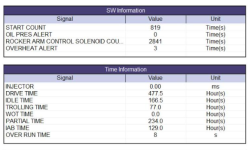Chester543
New member
Hello.
I've found a boat that will fit my needs perfectly but both the main and the kicker outboards have low compression. They have even compression but they're all low.
It's on consignment at a dealership and I had their shop do the compression test.
They say the engine "runs and functions as it should". I live 3.5 hours away and have not had time to go check it out in person or do a sea trial.
Main engine:
2004 Honda BF150 - 477.5 Hours
#1 115 psi
#2 115 psi
#3 115 psi
#4 115 psi
They did a second test a day later after warming up the engine for a 20min or so. Tested at 125psi across all cylinders.
Here's a pic of their Honda diagnostics reading showing the hours, start count, etc.

From the Honda service manual I found, compression specs are 222-250 psi. People on the interwebs seem to usually be testing around 170 - 210.
With it being 20 years old, I would not be expecting it to be in the 222-250 range but certainly in the 170-200ish range.
My thought is that there might be carbon buildup on the rings and/or valves thus causing the low compression. That would be my guess with the overall low hours, but I'm no expert...
Could doing some kind of decarbonizing/seafoam/etc return this engine to normal?
The owner says it works as it should but if I had to guess it might be losing some top-end rpm's and power.
Can anyone with experience with these engines shine some light on the situation?
Is the engine worth working on?
Should I just assume it's toast and needs a re-power?
The owner is refusing to do any engine work on it and is selling it as-is/where-is because "it's a running/functioning outboard"
There are not many boats like this one so it's not as easy as moving on to a different boat. Ideally, I would like to figure out how to make this option work for me.
Here is the info on the kicker:
2004 Honda 8hp - unsure of hours
#1 105 psi
#2 105 psi
Also testing low...
Thanks for any help on this!
I've found a boat that will fit my needs perfectly but both the main and the kicker outboards have low compression. They have even compression but they're all low.
It's on consignment at a dealership and I had their shop do the compression test.
They say the engine "runs and functions as it should". I live 3.5 hours away and have not had time to go check it out in person or do a sea trial.
Main engine:
2004 Honda BF150 - 477.5 Hours
#1 115 psi
#2 115 psi
#3 115 psi
#4 115 psi
They did a second test a day later after warming up the engine for a 20min or so. Tested at 125psi across all cylinders.
Here's a pic of their Honda diagnostics reading showing the hours, start count, etc.

From the Honda service manual I found, compression specs are 222-250 psi. People on the interwebs seem to usually be testing around 170 - 210.
With it being 20 years old, I would not be expecting it to be in the 222-250 range but certainly in the 170-200ish range.
My thought is that there might be carbon buildup on the rings and/or valves thus causing the low compression. That would be my guess with the overall low hours, but I'm no expert...
Could doing some kind of decarbonizing/seafoam/etc return this engine to normal?
The owner says it works as it should but if I had to guess it might be losing some top-end rpm's and power.
Can anyone with experience with these engines shine some light on the situation?
Is the engine worth working on?
Should I just assume it's toast and needs a re-power?
The owner is refusing to do any engine work on it and is selling it as-is/where-is because "it's a running/functioning outboard"
There are not many boats like this one so it's not as easy as moving on to a different boat. Ideally, I would like to figure out how to make this option work for me.
Here is the info on the kicker:
2004 Honda 8hp - unsure of hours
#1 105 psi
#2 105 psi
Also testing low...
Thanks for any help on this!

